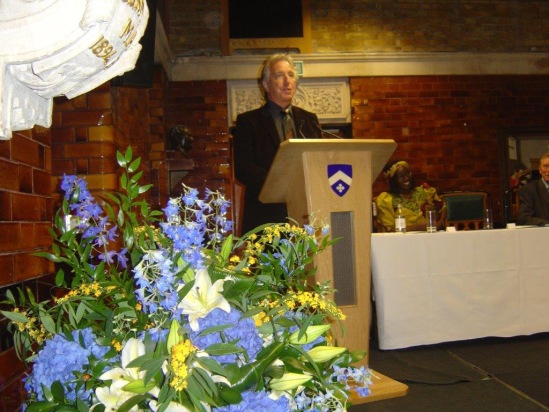Prize Giving 2007 Speech by Guest of Honour
Latymer Upper School Annual Prize Giving – 2007
I have to say this is a slightly out of body experience.
Apparently, I’m talking to the Latymer pupils even though I’m clearly staring only at parents and staff.
The Headmaster assures me I’m being ‘beamed’ to the pupils but my question is –
How does he know? Can he be sure? Where are they? Are they still there?
This situation seems to me to be open to infinite abuse.
On my side, you see, I have hindsight.
Assuming there are some students, in some room, somewhere, and if my experience of this occasion still applies, they are not so much listening as glued to a stopwatch because someone is running a book on how long this diatribe will last.
That word. Hindsight.
People always talk about ‘the benefit of hindsight’. Right now it seems a cruel thing. Standing here, time contracts alarmingly. It honestly feels not so long ago that I was down there in morning assembly tugging at a year-old tie knot. Flashing in front of my eyes I see an awful lot of laughter and friendship, heroics and stupidities, equal measures of hard work and spectacular time-wasting.
Speaking of which – one of the major skills I developed at Latymer, during certain lessons, was gazing out of the classroom window for minutes on end, hopefully persuading the teacher that I was pondering a concept or two, when in fact I was on another planet entirely and stopping only just short of dribbling.
It’s a lost art, I suspect. But we were in classes of thirty, no computers and no girls. Minds could drift.
Whilst perfecting this technique, I had vaguely noticed, on occasion, groups of pupils in uniform marching about the playground and being yelled at. A class know-all explained that this was called The Cadet Corps. This, apparently, was where you could practise being in the Army, Navy or Air Force while still at school. In due course, we were all invited – in a compulsory sort of way – to visit the three wooden huts that housed these entities. A recruitment drive, basically, with slightly less yelling and a lot of pointing with sticks. It was somewhere during a demonstration of the versatility of the billy-can (I’m not proud of myself) that I started laughing. This happened in each of the three huts in turn and received exactly the same response –
“Get out Rickman – we don’t want your sort in here.”
My sort?
What sort was that?
What sort indeed is that?
Well. Utterly shaped by this school for a start.
What sort was I, when I first arrived at Latymer?
I knew I was bright but a dreamer.
I knew that I was somewhere special.
I knew I was lucky to be there.
I knew that some boys had had an easier path to the school than I had
I knew that a lot of faith had been placed in me and a lot of sacrifices had been made.
I was a scholarship boy – every bit of uniform hard won and queueing up for free lunch tickets on Monday mornings.
Poor boy at a posh school.
What I quickly learned was – so what?
Again, with hindsight, I can see that no judgements were made or allowed to be made.
That had to come from a school confident in itself and its history.
There were definitely ghosts clinging to the walls but the school’s feet were planted firmly in the present.
Free thinking but disciplined with it.
I had an immediate sense, even if I wasn’t framing the sentence, that here was a place to discover who I was – my sort – and what I might do.
Outside of the Cadet Corps eccentricities were tolerated, possibly even encouraged.
Nowadays you’re all so cool and groomed. Then, eccentricity was our only option, it seemed. Look at the old school photographs. Row upon row of appalling haircuts.
Anyway – I was excited. I had come somewhere ‘other’. And it felt like home.
The source of this collective ethic lives somehow in the fabric and brickwork of the school, but crucially it was kept alive and constantly re-invented by the staff.
I happily acknowledge the debt I owe to some very great teachers.
For some the connection was more easily made than for others. Science, unfortunately, was – often literally – a closed book to me. Fred Mayo (‘Sir’ to his face, Fred to us) was a great Physics teacher but I must have been staring out of the window…
I got four percent for one exam. ‘A hysterical paper’ he wrote. I wasn’t sure if he was referring to my state when writing it (correct) or his when reading it.
Maths? Lt. Col Stewart terrified the life out of me. A subliminal Cadet Corps thing? I don’t know…
But up in the Art Room, Alan Gwilt created a mini Republic full of experiment and uncertainty – a tradition I’m glad to see thriving today.
Mostly, however, it was the English staff who became the stuff of legend to us. Inspirational as they opened our minds and spirits in the most impassioned and clear-sighted way to the tumults of Chaucer, Hopkins, Conrad, Donne and Shakespeare, they were also beacons of individuality.
That is to say, each in his own way, nuts.
Whether it was Brian Binding perched in his favourite teaching position on a radiator, or Ted Stead in full flight, seemingly hanging from the light fittings, they knew how to grab your attention.
And their influence wasn’t just academic.
I was given invaluable early lessons in theatrical survival skills as the same teachers elbowed their way past us on their way to the front of the stage at Christmas shows.
Not that you would have missed them. I mention only Colin Turner as Ginger Rogers and Jim McCabe as Elizabeth 1st. I myself have stood in this same spot in harem gear and a yashmak as sixth wife to Wilfrid Sharp (Head of English) as Ali Baba.
Learning my craft.
In the classroom, however, these same teachers were pushing us to have opinions, make choices, take a stand. Nudging ‘my sort’ into action.
What was going on in my head at the time? Exam pressure, financial pressure. I could feel the changes but it was hard to isolate them. Nowadays my politics and energies are a little more defined so I can only describe my time at Latymer as – in every sense of the word – a privilege.
There is obvious elitism in a system which has an independent school spending three times as much per student per year as the State does.
You are very privileged. That’s not a skill. You are lucky to be here, too. So take no credit for it – you are an accident of birth. A chemical equation made of genetics and (unless you, too, are a scholarship student) your parents’ bank balance.
The world owes you nothing, so I hope to God you make the most of this opportunity and figure out what the payback might be one day, otherwise this kind of privilege makes no sense at all. It’s just part of an Olde Englande that consistently proves itself so hard to shift or challenge.
An England made up of not so much a backbone as a compacted spine. Something constipated and repressed where passion is a pair of ever-pursed lips.
An American friend of mine says ‘I start apologising as soon as I step off the plane at Heathrow.’
It’s an England that can’t produce a tennis champion because no-one with the requisite mental rigour can get anywhere near the facilities.
And be wary of success – the English press will be sniffing around your dustbins and snapping at your heels.
I can’t believe this stuff still holds true – but it does.
Fortunately, there’s another England minnowing through the cracks and that England needs your energies because it holds your future. It is multi-cultural, has great new music, the 2012 Olympics, wins the Pritzker Prize for Architecture and the Nobel Prize for Medicine. So – just for reference over the next twenty years, as you assume the seats of power – could I put in a request for this country and the old people’s home I’ll be in to be imaginative, brave, unselfish, tolerant, socially and globally responsible.
Good luck with the crazy world we’re leaving behind. It will be your call. As far as I can see my generation gave you The Pill and The Beatles, so there’s plenty of scope.
Choose. What’s your sort going to be?
Rupert Murdoch or Nelson Mandela?
Paris Hilton or Rachel Corrie?
I mention her because she was one of you. Very young. Twenty three when she was killed four years ago in Palestine. For those who don’t know, she was an American peace activist who wrote vibrant testimony of her time in Gaza, but whose voice belonged to no-one but herself. I know this because I co-edited and directed her writing as a play at the Royal Court and in New York. Some of you came to see it and we talked afterwards.
This is taken from the programme notes written by Rachel’s parents Cindy and Craig Corrie for a recent Spanish language production of the play in Lima Peru.
‘We were asked recently what sort of memorial we would like built to remember Rachel. Well, Rachel would be the first to remind us that this is not about her. She would remind us that she comes from a community of privilege and we must remember first those among us who come from communities without privilege, that come from communities without even the privilege to stand and remember their own sacrifice. To build a memorial to honor these people we must build a world of justice, a world of dignity, a world of peace. We must build a world where each child born, whether they are born in Sweden or the Sudan, in Israel or Ireland, in Oakland or Oaxaca, in Reykjavik or Rafah, no matter where they are born – it is to a world of love and respect, of peace and justice. This is our job, and the world is our worksite.’
I’m sure that today they would add Burma to that list.
This is a time when you are subject to the hopes and voices of so many people – parents and teachers – that it is hard to feel your separateness. Hard for those people to see your separateness.
I quote Cindy and Craig Corrie because they are inspirational parents who allowed and encouraged their child to become herself, and because they remind me of who I am and where I came from. I assure you there is a traceable line from the twelve year old boy in assembly to the person standing here today. It began to be drawn at Latymer and for that I will always be grateful to this great school.
So to anyone still flirting with membership of Olde Englande I say – throw down your Mail on Sunday, roll up your sleeves and meet your destiny.
What sort are you?
You’re all prize winners, that’s for sure.
You are the fortunate ones.
Make a difference.
ALAN RICKMAN



